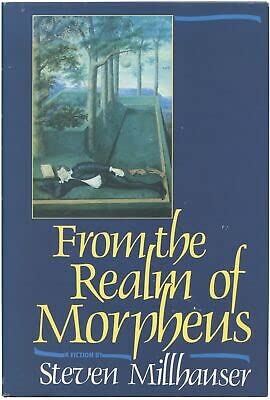What do you think?
Rate this book


233 pages, Hardcover
First published September 1, 1986
“Who knows not Morpheus, that tender lad? His hollow cheeks give him the appearance of one who perpetually sips nectar through a straw. One slender hand lies crossed over his alabaster chest and in the other hand he bears a copy of the Theaetetus with which he discreetly shields his private parts. It’s the wetdream of a Victorian vicar with a dubious passion for Greek.
Who knows not Morpheus, that tender lad?
His eyes are bloodshot, and his breath is bad.
But sit down, voyager, take a load off your feet. And stick that lamp or whatever it is somewhere or other why don’t you. It makes you look like the wistful offspring of the Statue of Liberty.”
Here books were fluttering across the aisle from one shelf to another, gently flapping their pages. Some of these books hovered uncertainly about the shelves, as if searching for a place to rest; others inserted themselves between books in rows, and appeared to sleep. Now and then the air became so thick with flying books that it became necessary for me to raise an arm before my face and with my other hand to push the sharp-edged books carefully aside as I passed. Once a book landed lightly on my shoulder and after a few steps rose with gentle flapping sounds and flew to a higher shelf.
Woo not and wed not, sue not and dread not; for well wed is ill sped, and fair married foul harried. Beware the mar in marriage, and wedlock’s lock; shun holy acrimony, nor hang thyself with a well-tied nuptial knot.